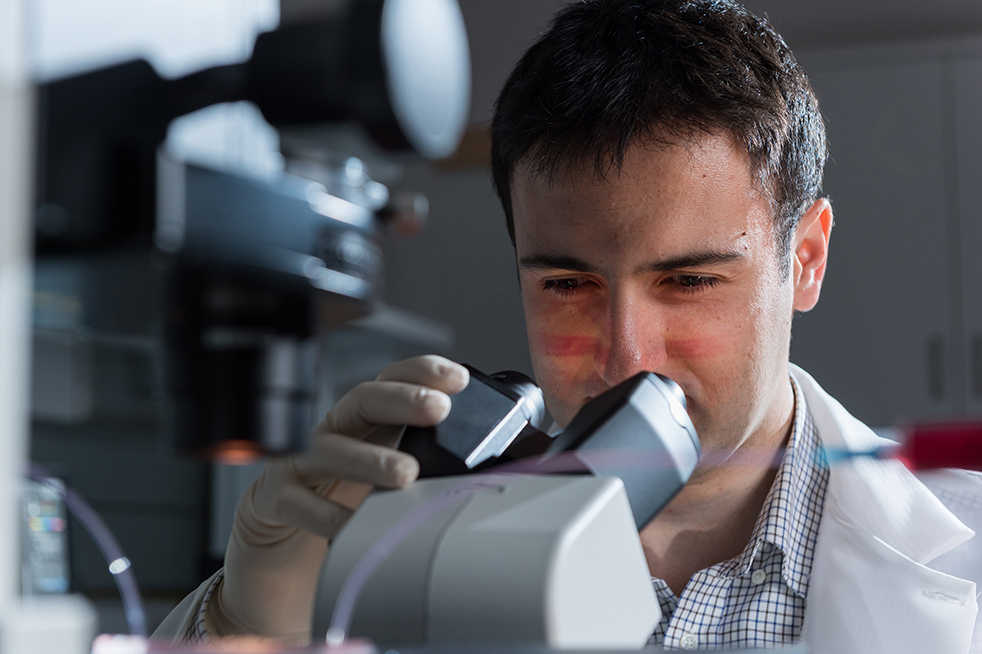“50 years ago, a series of experiments was conducted with mice models, which essentially consisted of injecting one group with tumor cell lines that did not have clusters and another group with tumor cell lines formed in cluster — each with the same known number of total cells. The results showed that these clusters were more prone to metastasis — the spread of cancer; however, the problem was that there were no tools at the time to isolate these clusters from patient samples,” said A. Fatih Sarioglu, assistant professor of Electrical and Computer Engineering. “Essentially, what we have done is opened the door to look at these extremely dangerous group of circulating tumor cells.”
From the mid-twentieth century, the word “cancer” has become somewhat of a buzzword in the scientific community, propelling it to the forefront of scientific research with hundreds of advancements made in understanding the unique nature of the disease and its treatment, including chemotherapy and targeted drug treatments. However, very few tools existed to effectively analyze and treat an isolated case of cancer in a patient.
“One of the important developments in science that is happening now is that we understand cancer to be a very complex disease. Before, we applied chemotherapy to everything, hoping it would solve all our problems. Cancer needs to be seen on the molecular [level].
“Rather than trying to cure cancer, I believe it needs to be seen as a chronic disease so we can control and monitor therapy. Our understanding of cancer is changing, and the tools we have through the research advancements are giving rise to the opportunity to do cancer management in a much more efficient way,” Sarioglu said.
The research group of Sarioglu, under the Integrated Cancer Research Center (ICRC) at Tech and in conjunction with Emory Hospital, has developed the Cluster Chip, a microfluidic chip that acts as both a detection tool to prevent the advancement of cancer and aid in the analysis of tumor clusters.
“Cancer rarely kills from the primary tumor. 90 percent of the time, cells shed through — which is traveling through the bloodstream and relocating to another location and metastasizing there. Imagine what you could do if you catch one of those cells. You can use them to understand the biology of the cancer metastasis, which is important because if you can find a way to contain it as a primary tumor, you would be able to save lives.
“The second part of that statement is that you can use the technology to detect cancer. These cells start appearing in the body earlier than the symptoms, so that is why it is important to find those tumor cells — it is like looking for a needle in a haystack. You need technologies that can precisely test those cells,” Sarioglu said.
The “Cluster-Chip” developed by his lab group, for which a paper was published in Nature Methods in May of 2015, isolates the clusters of tumors, which Sarioglu identifies to be the root cause of metastasis. According to the publication, between 30 and 40 percent of the patients who had metastatic breast or prostate cancer or melanoma exhibited these tumor clusters within their blood.
“The way the device works is not like a filter because if these clusters could pass through the micro capillaries in the blood, then what is to say that they wouldn’t pass through a filter? It is pretty simple the way that the device is structured: we have three triangular posts linked together by small enough spaces where only a single cell could pass through. On each chip, there were about 30,000 posts looking and analyzing for these clusters in approximately 10 mL of blood. If there is a cluster, the cluster is easily captured,” Sarioglu said.
The benefit of utilizing the Cluster Chip developed by the Sarioglu lab is that the device opens the door for future research and analysis of cancer.
“Essentially, what we have done is opened the door to look at these extremely dangerous group of circulating tumor cells. Now we can use them to understand therapeutic ways to treat the cancer, such as attack the junctions in the clusters to make them single cells so they will be more prone to death and avoid creating another tumor. There is a lot of potential to also use these clusters in a petri dish to produce more cells and start forming someone’s tumor to drug test before giving the drug to another patient. The common problem people are facing in this area of research is that the cells in the petri dishes cannot proliferate. One promise of CTC clusters is that they are viable seeds to perform research on. Our technology opens doors to all kinds of research,” Sarioglu said.
Sarioglu’s research utilizes cross-disciplinary engineering, joining disciplines such as mechanical, biomedical and electrical engineering. Like Sarioglu’s research, IRIC’s mission for the advancement of cancer research is “to facilitate integration of the diversity of technological, computational, scientific and medical expertise at Georgia Tech and partner institutions in a coordinated effort to develop improved cancer diagnostics and therapeutics.”
